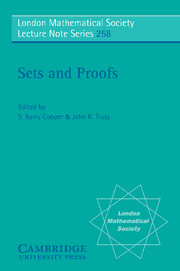Book contents
- Frontmatter
- Contents
- Preface
- An Introduction To Finitary Analyses Of Proof Figures
- What Mathematical Truth Could Not Be – II
- Proof Search in Constructive Logics
- David's Trick
- A Semantical Calculus for Intuitionistic Propositional Logic
- An Iteration Model Violating the Singular Cardinals Hypothesis
- An Introduction to Core Model Theory
- Games of Countable Length
- On the Complexity of the Propositional Calculus
- The Realm of Orinal Analysis
- Covering Properties of Core Models
- Ordinal Systems
- Polish Group Topologies
- Forcing Closed Unbounded Subsets of Nw+1
- First Steps into Metapredicativity in Explicit Mathematics
- What Makes A (Pointwise) Subrecursive Hierarchy Slow Growing?
- Minimality Arguments for Infinite Time Turing Degrees
What Makes A (Pointwise) Subrecursive Hierarchy Slow Growing?
Published online by Cambridge University Press: 05 September 2013
- Frontmatter
- Contents
- Preface
- An Introduction To Finitary Analyses Of Proof Figures
- What Mathematical Truth Could Not Be – II
- Proof Search in Constructive Logics
- David's Trick
- A Semantical Calculus for Intuitionistic Propositional Logic
- An Iteration Model Violating the Singular Cardinals Hypothesis
- An Introduction to Core Model Theory
- Games of Countable Length
- On the Complexity of the Propositional Calculus
- The Realm of Orinal Analysis
- Covering Properties of Core Models
- Ordinal Systems
- Polish Group Topologies
- Forcing Closed Unbounded Subsets of Nw+1
- First Steps into Metapredicativity in Explicit Mathematics
- What Makes A (Pointwise) Subrecursive Hierarchy Slow Growing?
- Minimality Arguments for Infinite Time Turing Degrees
Summary
Abstract
A subrecursive hierarchy (Pα)α<ε0 of unary number-theoretic functions is called the slow growing if each Pα is dominated by a Kalmar elementary recursive function. A subrecursive hierarchy (Pα)α<ε0 is called pointwise if the value of Pα(x) can be computed recursively in terms of Pβ(x) with β < α but with the same argument x. The point-wise hierarchy (Gα)α<ε0 is defined recursively as follows: G0(x) := 0; Gα+1(x) := 1 + Gα(x); Gλ(x) := Gλ[x](x) where λ is a limit and (λ[x])x<ω is a distinguished fundamental sequence for λ. If (Gα)α<ε0 is defined with respect to the standard system of fundamental sequences then (Gα)α<ε0 is slow growing.
In the first part of the article we try to classify as well as seems possible those (natural) assignments of fundamental sequences for which the induced pointwise hierarchy remains slow growing or becomes fast growing in the sense that the resulting hierarchy matches up with the Schwichtenberg-Wainer hierarchy (Fα)α<ε0. To exclude pathological cases we only consider elementary recursive assignments which are natural at least in the sense that their associated fast growing hierarchies classify exactly the provably recursive functions of PA. It turns out that the growth rate of the pointwise hierarchy is intrinsically connected with strong continuity properties of the assignment of fundamental sequences with respect to ordinal addition.
- Type
- Chapter
- Information
- Sets and Proofs , pp. 403 - 424Publisher: Cambridge University PressPrint publication year: 1999
- 5
- Cited by

